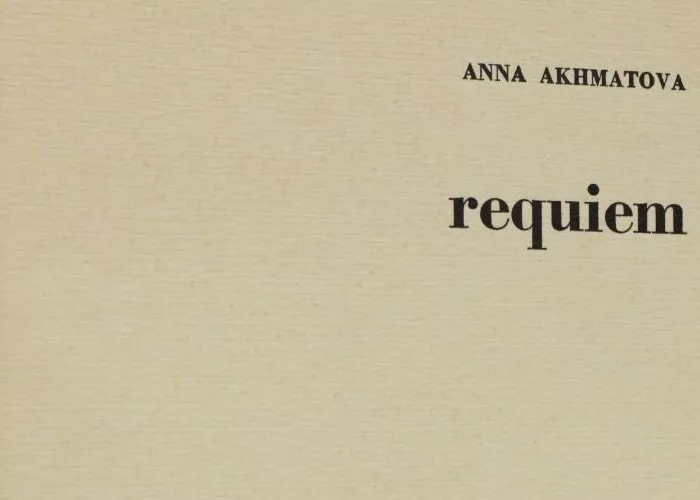Welcome to Poem of the Day – Requiem by Anna Akhmatova.
Anna Akhmatova’s Requiem stands as one of the most profound works of 20th-century Russian poetry, capturing the harrowing experience of personal and collective loss during the Stalinist terror. Written between 1935 and 1940, Requiem chronicles the suffering of a mother whose son has been arrested and the anguish of those living under the oppressive rule of Stalin’s regime. The poem is both a personal elegy and a powerful commentary on the toll of political repression. In examining Requiem, we not only encounter a poet’s grief but also an artistic response to the stifling forces of tyranny and the resilience of the human spirit.
Requiem Poem Explanation
At the heart of Requiem lies Akhmatova’s deeply personal sorrow, a sorrow that is interwoven with the collective grief of the Russian people. The poet’s son, Lev, was arrested in 1935 and imprisoned for many years, an experience that deeply influenced the creation of this work. Akhmatova, unable to express her sorrow publicly due to the oppressive nature of Stalin’s regime, turned to poetry as a means of catharsis. Requiem becomes, therefore, both a personal expression of loss and a public memorial to the millions who suffered under Stalin’s purges.
The structure of Requiem is integral to its thematic concerns. The poem is divided into a series of cantos, each a meditation on different aspects of grief and survival. The work as a whole moves through stages of sorrow, from the initial shock of loss to the painful endurance of waiting and the struggle to keep memory alive despite the silencing of the individual. The long poem itself is a requiem—both a funeral song and a prayer—an acknowledgment of death and loss as permanent parts of life.
The Power of Memory and Survival
One of the central motifs in Requiem is the struggle to retain memory amidst overwhelming loss. Akhmatova confronts the ways in which a totalitarian regime attempts to erase personal and collective histories, to impose an ideological “truth” that silences dissent. The poet’s memory becomes an act of resistance: in a world where personal suffering and trauma are suppressed, the act of remembering and recounting becomes a form of survival. Akhmatova’s poetry becomes the repository for these repressed experiences, offering an alternative history to the one written by the state.
The motif of memory is closely linked to the poet’s reflection on time. In a passage that resonates deeply with the reader, Akhmatova writes about the agony of waiting for a loved one who has been taken away by the authorities, a feeling she likens to a form of eternal suspension. The arrested individual is not only physically removed from the world; they are also denied a future. But in writing and in memory, Akhmatova asserts the possibility of reasserting control over time. Her words become a declaration that the past is not easily erased, that even in the face of violence and oppression, memory persists.
The Poem as a Requiem
The title of the poem itself, Requiem, is significant. Traditionally, a requiem is a mass for the dead, a ceremony of mourning. Yet, in Akhmatova’s case, the “dead” are not merely those who have passed away, but those who have been killed by the system, those whose voices have been silenced. Requiem transcends the personal and moves into the realm of the collective. It is a monument to the millions of people who suffered under Stalin, a tribute to the dead whose names and fates remain unknown.
Moreover, the poem’s use of religious imagery enhances its solemnity and depth. Akhmatova invokes the language of the liturgy, both as a personal way of seeking solace and as a means of aligning her own grief with that of a wider, almost sacred mourning. The echoes of Christian rituals—mourning, remembrance, and resurrection—suggest that the act of remembering the dead is not merely an act of sorrow, but also an act of spiritual defiance. In this way, Requiem becomes an existential declaration: the dead may be forgotten by history, but they live on in the hearts of those who remember them.
The Voice of the Poet: A Medium for the Voiceless
One of the most striking features of Requiem is Akhmatova’s ability to give voice to the voiceless. Through her poetry, she channels not only her personal anguish but also the shared experiences of the oppressed. The poem is filled with descriptions of the many women who, like her, wait in despair outside prisons for a glimpse of their loved ones. These women become symbolic of the countless unnamed individuals whose suffering is erased by the regime. Akhmatova’s depiction of these women, often portrayed as silent figures whose identities are subsumed in their grief, transforms them into symbols of collective suffering and resilience.
Akhmatova’s use of voice is not just a representation of pain, but also an assertion of agency. In a society where speaking out is dangerous, the act of giving voice to those who are silenced becomes an act of defiance. Through Requiem, Akhmatova resists the erasure of the individual and gives a poetic voice to those whose lives have been torn apart by political violence.
Conclusion
Requiem is more than just a poetic exploration of grief; it is a testament to the endurance of the human spirit in the face of tyranny. Akhmatova’s ability to channel personal pain into a broader cultural commentary allows the poem to transcend its immediate historical context, speaking to universal themes of loss, memory, and survival. It stands as a profound meditation on the cost of political oppression and the importance of memory in preserving both individual and collective histories. Through Requiem, Akhmatova asserts that even in the darkest moments, when words are silenced and histories erased, poetry endures as a form of resistance—a requiem for the dead, but also a living testimony to their lives.

